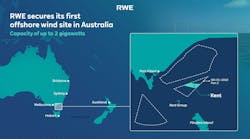The Clinton administration's ocean policy has been a source of great puzzlement for those of us connected to the domestic offshore oil and natural gas industry. After receiving an excess of mixed messages during Mr. Clinton's tenure, we are not sure where we stand or what we are to believe.
Take, for example, the administration's new report "Turning to the Sea: America's Ocean Future." The report takes a surprisingly balanced approach towards offshore energy. Not only does it recognize how vital oil and natural gas resources located on the outer continental shelf (OCS) are to our domestic energy supplies and nation's security needs, but it highlights the importance of natural gas reserves on the OCS, as natural gas will increasingly be used to meet growing energy demands.
However, as the old adage goes, "actions speak louder than words," and unfortunately, this administration has a record of not following its own policy advice. Consider the following chain of events:
- In 1995, the Clinton administration issued a national energy policy plan entitled "Sustainable Energy Strategy." The plan, in part, states that the administration is "committed to enhancing the competitiveness of domestic oil producers" and "expanding the role of clean, efficient, and domestically produced natural gas."
- In March 1998, the administration released "Year of the Ocean: Discussion Papers." Prepared by the federal agencies with ocean-related programs, the document states that the environmentally sound development of the nation's OCS will help advance the energy policy plan outlined in 1995 (referenced above). In addition, the document asserts, "offshore development under proper environmental safeguards poses less risk of large oil spills than does importing foreign oil in tankers."
- In April 1998, the administration released its Comprehensive National Energy Strategy. The plan seeks to arrest the decline in domestic oil production by the year 2005, by supporting "environmentally responsible development of leased federal lands for oil recovery." It also seeks to increase domestic production of natural gas by as much as six trillion cu ft per year by the year 2010.
- On June 12, 1998, during the National Ocean Conference in Monterey, California, President Clinton issued an executive order extending and expanding the moratorium on oil and gas leasing off most areas of the U.S. outside the Central and Western Gulf of Mexico and Alaska until 2012. In making his announcement, the president said, "we must save these shores from oil drilling."
- On Sept. 2, 1999, the administration released a report entitled, "Turning to the Sea: America's Ocean Future." The report, introduced by Vice President Gore, states that "natural gas reserves in the Outer Continental Shelf are particularly important because natural gas has major environmental benefits over other fossil fuels. Cleaner burning, it is increasingly being used in the conversion of electrical power generating stations from oil or coal-fired facilities."
- On Oct. 21, 1999, exactly seven weeks after Mr. Gore unveiled "Turning to the Sea: America's Ocean Future," the vice president announced that, if elected president, he would put a stop to all new drilling in federal waters off the shores of California and Florida. "I will take the most sweeping steps in our history to protect our oceans and coastal waters from offshore oil drilling," Gore proclaimed. "I will do everything in my power to make sure that there is no new drilling off these sensitive coasts [California and Florida] - even in areas already leased to companies by the federal government."
These actions have left the offshore industry scratching its collective head. How does the administration expect to use natural gas as a bridge between traditional fossil fuels and renewable energy sources if the industry is not allowed to explore and develop it?
Why is the administration concerned with saving our shores from oil drilling when it has recognized that foreign tankers pose a greater risk to our nation's shores than does offshore exploration and production, and that advances in technology have made offshore oil and gas production cleaner and safer than ever?
One thing is clear. As long as this administration develops ocean policy based on politics rather than careful analysis, the U.S. offshore energy industry can expect more mixed messages.




